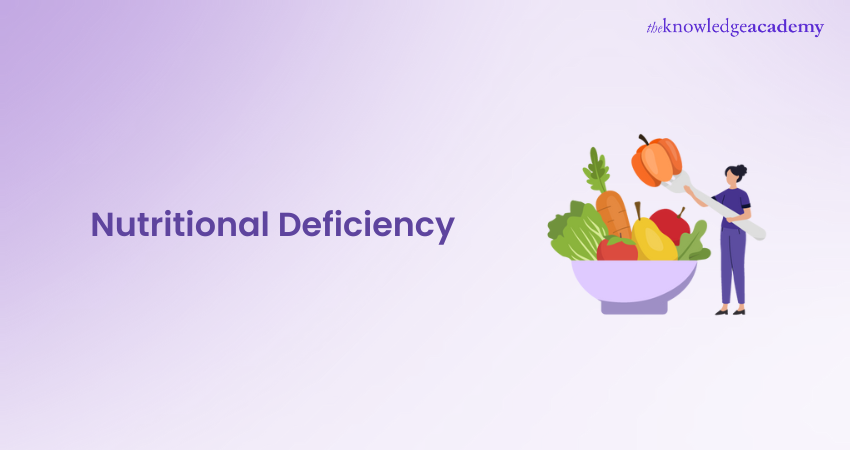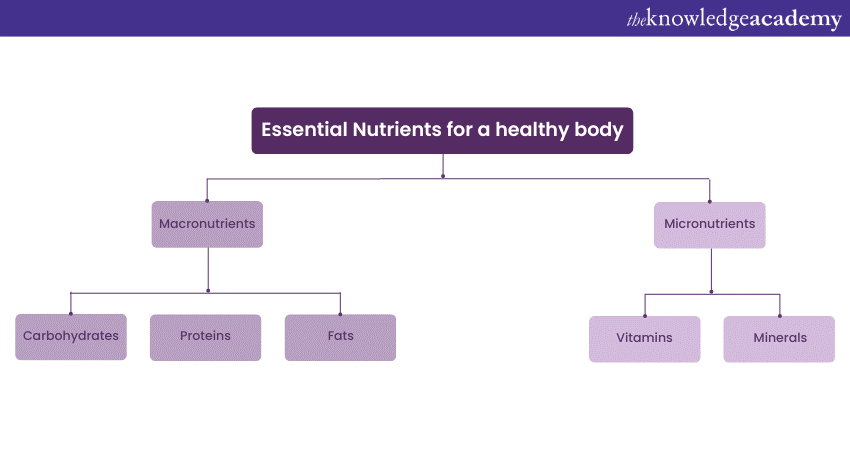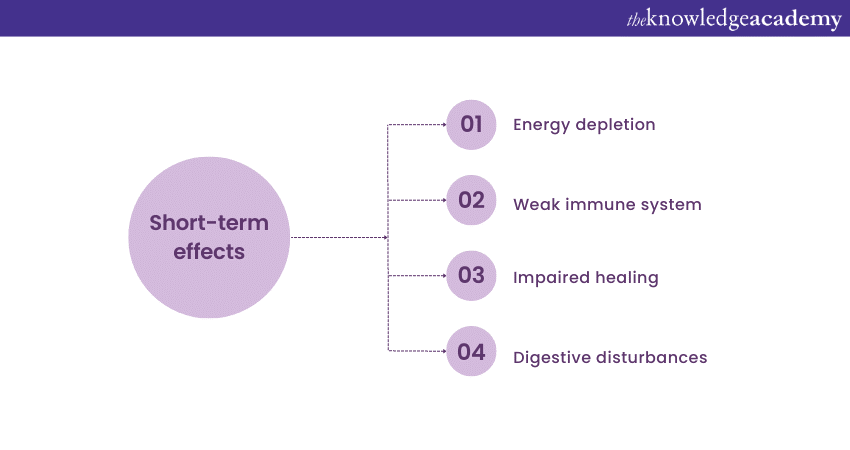We may not have the course you’re looking for. If you enquire or give us a call on +44 1344 203 999 and speak to our training experts, we may still be able to help with your training requirements.
Training Outcomes Within Your Budget!
We ensure quality, budget-alignment, and timely delivery by our expert instructors.

Nutrition forms the foundation of our vitality and sustenance. It's the foundation upon which our bodies build their resilience and functionality. Within this intricate interplay of Nutrients lies a critical concept: Nutritional Deficiency. In this blog, we will gain clarity on Nutritional Deficiency and understand its profound implications on human health.
Table of Contents
1) Understanding Nutritional Deficiency
2) Essential Nutrients for a healthy body
3) Signs and symptoms of Nutritional Deficiency
4) Impact of Nutritional Deficiency on health
5) Diagnosing Nutritional Deficiency
6) Preventing Nutritional Deficiency
7) Conclusion
Understanding Nutritional Deficiency
Nutritional Deficiency occurs when our bodies yearn for specific Nutrients vital for optimal functioning. These Nutrients are the building blocks that orchestrate various biochemical reactions, energy production, and cellular maintenance. A deficiency emerges when we fail to provide our bodies with the required nutrients through our diets, disrupting the delicate equilibrium that ensures our well-being.
Common Causes of Nutritional Deficiency
The causes are multiple: an imbalanced diet lacking essential Nutrients, restricted calorie intake driven by weight loss ambitions, underlying medical conditions hampering nutrient absorption, and even lifestyle choices that veer toward indulgence in harmful substances. The intricate mix of these factors can result in a deficiency that varies from individual to another, creating a complex puzzle for healthcare professionals to solve.
Essential Nutrients for a Healthy Body
In human biology, essential Nutrients are critical to good health. These nutrients are categorised into two fundamental groups namely macronutrients and micronutrients, each playing a distinctive role in maintaining the body's harmony.

Macronutrients
a) Carbohydrates: These energy-providing compounds are the body's primary fuel source. They are broken down into glucose, which powers our cells, muscles, and brain. A balanced intake of complex carbohydrates from sources like whole grains, fruits, and vegetables ensures sustained energy levels and stable blood sugar.
b) Proteins: Often dubbed the body's building blocks, proteins are essential for tissue repair, immune function, enzyme production, and more. A diverse range of protein sources, such as lean meats, legumes, dairy, and plant-based options, ensures our bodies receive the required amino acids.
c) Fats: Fats are not just for energy storage; they also play a vital role in cellular structure, hormone synthesis, and insulation. Opting for healthy fats from sources like avocados, nuts, seeds, and fatty fish contributes to overall well-being.
Micronutrients
Vitamins: These organic compounds act as catalysts for numerous biochemical reactions. From immune support (vitamin C) to bone health (vitamin D) and beyond, vitamins are pivotal for various bodily functions. A rainbow of fruits and vegetables offers diverse vitamins to keep us in top form.
Minerals: Often overlooked, minerals like calcium, iron, zinc, and magnesium are indispensable for maintaining bone health, oxygen transport, immune function, and more. Incorporating nutrient-rich foods and, in some cases, supplements ensure our bodies receive the mineral support they need.
Invest in yourself! Dive into Healthy Lifestyles Training and watch your health flourish!
Signs and Symptoms of Nutritional Deficiency
The absence of essential elements can trigger warning signs in the complex interplay of Nutrients and bodily functions. Nutritional deficiencies manifest in diverse symptoms, each acting as a unique signal from our bodies that a particular nutrient is lacking. In this section, we will look into Nutrient Deficiency symptoms to further understand the subject:
Some of the common symptoms
Fatigue and weakness: An everyday companion of various deficiencies, fatigue and weakness result from the body's struggle to produce energy without the necessary Nutrients.
Hair and skin issues: Brittle hair, hair loss, dry skin, and even changes in pigmentation can indicate a deficiency in vitamins and minerals essential for healthy skin and hair.
Muscle cramps: A lack of minerals like magnesium and potassium can result in muscle cramps and spasms, often striking when we least expect them.
Digestive distress: Nutritional deficiencies can disrupt digestive processes, leading to symptoms like constipation, diarrhoea, and bloating.
Burning Sensation in the Feet or Tongue
Vitamin B12 can be used as an example of a nurturing guardian for your cells. It crafts hemoglobin, the lifeline of red blood cells. This ensures every part gets to breathe in the oxygen it needs. It makes sure that the bodily system runs without a hitch.
Now, if Vit B12 starts to shed, you might feel the subtle shifts in your mind’s clarity. Sudden memory drops, a foggy thought, a change in how you tackle your day, these are certain symptoms. Vit B12 does not only concern the present; it is about safeguarding your nervous system’s future. Vitamin B12 might not be present in plant-based diet, so remember to intake almond milk, coconut milk, soy, and nutritional yeast,
Wounds are Slow to Heal
With a Vitamin C deficiency, you are likely to bruise easily. Along with that, the healing process is slow. Vitamin C has many benefits. It can serve as an anti-inflammatory element and as an antioxidant to stop cell damage.
One way to stop it is to quit smoking if you are a smoker. It limits your body's ability to absorb vitamin C. Consume more fruits and vegetables like red bell peppers, kiwi, oranges.
Irregular Heartbeat
Calcium is responsible for regulating your heartbeat. Therefore, a calcium deficiency can cause arrhythmia, also colloquially known as irregular heartbeat. It can also cause chest pain.
Few other signs include:
a) Muscle Contraction: Muscle contraction around your face and mouth is visible. As calcium works with muscles, its deficiency leads them to contract.
b) Fractures: Calcium is also needed for strong bones. Without it, bone loss or fractures are common.
c) Muscle Cramps: Without enough calcium, the muscles do not fully relax. This leads to muscle cramps.
Consuming calcium-rich food is highly recommended.
Your Night Vision Deteriorates
A lack of Vitamin A causes many issues related to the eye. The cornea becomes dry making the sight cloudy. This can also lead to vision loss. Along with that it can damage the retina, causing deterioration of night sight.
A diet rich in vitamin A can solve some problems. It includes milk, eggs, mangos, black-eyed peas, sweet potatoes and apricots. It can help in achieving Vitamin A.
Cognitive and Emotional Symptoms
Mood disorders: Inadequate intake of certain Nutrients, like omega-3 fatty acids and B vitamins, has been linked with mood disorders.
Poor concentration: A deficiency in essential Nutrients can impair cognitive function, leading to difficulties in attention, memory, and focus.
Irritability and stress: Nutrients like magnesium and zinc are vital in regulating stress responses, and their deficiency can contribute to heightened irritability and stress levels.
Cognitive decline: Over the long term, deficiencies in certain Nutrients have been associated with cognitive decline and an increased risk of neurological disorders.
Impact of Nutritional Deficiency on Health
The delicate balance between Nutrients and bodily functions is a testament to the intricate nature of human physiology. When this equilibrium is disrupted due to Nutritional Deficiency, the consequences can reflect throughout the body, impacting both short-term comfort and long-term well-being.
Short-term Effects

a) Energy depletion: Nutritional deficiencies can lead to a marked decrease in energy levels, leaving individuals feeling chronically tired and sluggish.
b) Weak immune system: Essential Nutrients, particularly vitamins and minerals like vitamin C and zinc, are crucial in supporting the immune system. Deficiencies in these Nutrients can render the body more susceptible to infections and illnesses.
c) Impaired healing: Protein, vitamins, and minerals are essential for tissue repair and wound healing. The body's ability to recover from injuries is compromised without an adequate supply of these nutrients.
d) Digestive disturbances: A deficiency in fibre and other essential nutrients can disrupt digestive processes, leading to discomfort, irregular bowel movements, and gastrointestinal issues.
Long-term Effects
a) Bone health: Deficiencies in calcium, vitamin D, and other bone-supporting Nutrients can lead to decreased bone density, osteoporosis, and a heightened risk of fractures.
b) Cardiovascular health: Inadequate intake of Nutrients like omega-3 fatty acids, potassium, and magnesium can contribute to cardiovascular issues, including high blood pressure and an increased risk of heart disease.
c) Neurological implications: Certain Nutrients, such as B vitamins and omega-3 fatty acids, play a critical role in brain health and cognitive function. Deficiencies in these Nutrients may contribute to cognitive decline and neurological disorders.
d) Developmental complications: Nutritional deficiencies during critical stages of growth and development, such as pregnancy and childhood, can lead to developmental delays, congenital disabilities, and other difficulties.
Kickstart your journey to vitality! Discover the benefits of Active and Healthy Lifestyles Training and energize your life today!
Diagnosing Nutritional Deficiency
While the symptoms of Nutritional Deficiency can provide valuable clues, a precise diagnosis requires a more comprehensive approach. Medical professionals employ various methods to identify nutrient imbalances and pinpoint weaknesses.
Medical Tests
a) Blood tests: Blood tests are a standard diagnostic tool for nutritional deficiencies. They measure the levels of specific Nutrients in the bloodstream, providing insights into whether the body is receiving adequate amounts. For instance, a blood test can reveal iron levels, indicating a potential risk of anaemia.
b) Complete Blood Count (CBC): This test assesses different blood components, which is inclusive of red and white blood cells. Abnormalities in these counts can indicate deficiencies in specific Nutrients, like vitamin B12 and folate.
c) Serum vitamin levels: Blood tests can measure the levels of various vitamins, helping identify deficiencies. For example, a deficiency in vitamin D can be detected by measuring 25-hydroxyvitamin D levels.
Consulting a Healthcare Professional
a) Medical history: Sharing your medical history, dietary habits, and any symptoms you're experiencing with a healthcare professional is crucial in diagnosing nutritional deficiencies. This information helps guide the diagnostic process and ensures a comprehensive assessment.
b) Physical examination: Healthcare professionals may perform a physical analysis to identify signs of nutritional deficiencies, such as skin changes, hair condition, and muscle weakness.
c) Discussion of symptoms: Communicating your symptoms and their duration is essential. Different deficiencies manifest with similar symptoms, so providing detailed information helps narrow down potential causes.
Preventing Nutritional Deficiency
Safeguarding your health against nutritional deficiencies involves prioritising a balanced and nutrient-rich lifestyle. Here are some key strategies to ensure your body receives the essential Nutrients.
Balanced Diet
a) Diverse food choices: Aim for a colourful plate filled with fruits, vegetables, whole grains, lean proteins, and healthy fats. Different foods provide different nutrients, so diversity is critical.
b) Portion control: Pay attention to portion amount to avoid overeating or under-consuming essential Nutrients. Moderation is necessary to maintain a balanced intake.
c) Mindful eating: Slow down during meals, chew thoroughly, and savour the flavours. Mindful eating promotes better digestion and absorption of nutrients.
Dietary Supplements
a) Targeted supplementation: Supplements may be suitable if certain nutrients are consistently lacking in the diet due to dietary restrictions or specific health conditions. However, consult a healthcare professional before taking any supplements.
b) Quality supplements: Opt for reputable brands that undergo rigorous testing to ensure potency and purity.
Lifestyle Factors
a) Limit processed foods: Processed foods are often stripped of essential nutrients and loaded with unhealthy additives. Minimise their consumption and focus on whole, unprocessed foods.
b) Hydration: Staying adequately hydrated is essential for nutrient transport and absorption. Water supports digestion and overall bodily functions.
c) Alcohol moderation: Excessive alcohol consumption can hinder nutrient absorption and lead to deficiencies. Moderation is vital to maintaining optimal nutrient status.
Understand the importance and benefits of practising Yoga by signing up for our Yoga Training now!
Conclusion
Nutritional Deficiency is a complex puzzle with far-reaching health implications. Acknowledging its signs, understanding its impact, and embracing preventive measures empower us to take charge of our well-being. By nurturing our bodies with the vital nutrients they need, we pave the path to a healthy life.
Learn the importance of nutrition by signing up for our Nutrition And Fitness Training now!
Frequently Asked Questions

Five Nutritional Deficiency diseases include respiratory infection, beriberi, rickets, pellagra and goiter.

Nutritional disorders are diseases that take place when a person's diet does not contain the adequate amount of nutrients for healthy life.

The Knowledge Academy takes global learning to new heights, offering over 30,000 online courses across 490+ locations in 220 countries. This expansive reach ensures accessibility and convenience for learners worldwide.
Alongside our diverse Online Course Catalogue, encompassing 17 major categories, we go the extra mile by providing a plethora of free educational Online Resources like News updates, Blogs, videos, webinars, and interview questions. Tailoring learning experiences further, professionals can maximise value with customisable Course Bundles of TKA.

The Knowledge Academy’s Knowledge Pass, a prepaid voucher, adds another layer of flexibility, allowing course bookings over a 12-month period. Join us on a journey where education knows no bounds.

The Knowledge Academy offers various Healthy Lifestyles Training, including the NEBOSH Courses, Fire Safety Training and Food Hygiene and Safety Training. These courses cater to different skill levels, providing comprehensive insights into Ways of Wellbeing.
Our Health & Safety Blogs cover a range of topics related to better lifestyle, offering valuable resources, best practices, and industry insights. Whether you are a beginner or looking to advance your Health and safety skills, The Knowledge Academy's diverse courses and informative blogs have got you covered.
Upcoming Health & Safety Resources Batches & Dates
Date
 Life Coach Training
Life Coach Training
Fri 28th Mar 2025
Fri 23rd May 2025
Fri 4th Jul 2025
Fri 24th Oct 2025
Fri 5th Dec 2025







 Top Rated Course
Top Rated Course



 If you wish to make any changes to your course, please
If you wish to make any changes to your course, please


